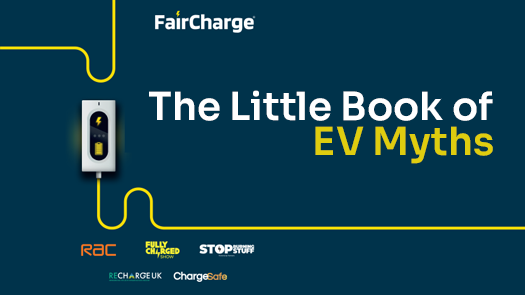Little Book of EV Myths
FairCharge have created "The Little Book Of EV Myths" that dispels 21 of the most incorrect EV misunderstandings!!!
We have summarised the full booklet below but to read the full booklet please visit:
https://www.faircharge.co.uk/little-book-of-ev-myths
EVs are more expensive than combustion cars
The price difference has narrowed considerably in recent years and continues to as technology grows.
EV batteries don’t last
There is no data to prove this, and industry experts now widely accept that EV batteries will outlast the chassis of the car.
EVs regularly catch fire
UK fire service records from 2022 to 2023 show that only 0.24% of vehicle fires were EV fires.
EVs pollute more than ICE cars
The full life cycle CO2 emissions of an EV are around three times lower than an average petrol car.
EVs shift emissions from roads to power stations
EVs are roughly four times more energy efficient than combustion cars, therefore reducing emissions even when being charged from fossil fuel heavy grids.
Hydrogen will displace EVs
There are many barriers to overcome for widespread hydrogen use, such as a high pressure, low temperature infrastructure, five times more energy to produce than electricity, logistical and storage challenges, and a pump cost that would be significantly more than petrol or diesel. The lifecycle emissions from a hydrogen car would also be 60% to 70% higher than that of an EV.
EVs cost more to maintain
There are around 20 moving parts in an EV compared to more than 2,000 in a combustion car. With no spark plugs, oil, timing belts or chains, exhausts, particulate filters, or clutches, there are less components that need maintenance or replacements.
EVs have short ranges
Research from Cap hpi shows that EVs are now covering similar annual mileages as combustion cars, with only 743 miles between them; 8292 for EVs and 9035 for petrol and diesel cars.
There aren’t enough critical minerals in the world for EV batteries
The Energy Transitions Commission estimate that by 2040 over 50% of lithium used in batteries could come from recycling. As new materials like silicone are used instead of graphite, the need for critical or rare earth minerals will reduce dramatically.
EVs lose much more range than petrol cars in winter
The latest generation of EVs now have heat pumps to reduce low temperature range loss but even combustion cars will lose 15% fuel efficiency in low temperatures.
The mining of materials for EV batteries is very bad for the environment
The Energy Transition Commission’s latest report states that the cumulative global emissions of CO2 and other greenhouse gases from battery mining and the production of solar panels and wind turbines
over the next 30 years will add up to between 15 and 35 gigatonnes of CO2, compared to the 40 gigatonnes of CO2 from global fossil fuel energy extraction that’s emitted every year.
Charging an EV from the UK grid where the electricity is created by burning gas makes no sense
The majority of EVs in the UK are charged by electricity generated by renewable sources such as wind, solar, biomass, hydro, and nuclear.
Taking away the right to drive a diesel is a loss of freedom
You can still drive and buy used combustion vehicles after 2035.
EV batteries run out of power and break down
EVs have significantly fewer breakdowns than combustion cars. In 2023, of all breakdowns the AA responded to only 2.86% of their entire breakdown call outs related to EV vehicles.
The car in the Luton car park fire was an EV
The vehicle that started the airport car park fire was a diesel engine 2014 Range Rover Sport as confirmed by the local fire authority.
The choice of new EV models is very poor
Five years ago, there may not have been many models to choose from but there are now close to 100 for sale on the UK market and choice will only improve as the ZEV mandate pushes car manufacturers to sell more EVs.
EV tyres cause high levels of particulate pollution
All vehicle tyres wear and leave nanoparticles of rubber in the atmosphere and rubber particulates on road surfaces. The average tyre wear on an EV is no different to that of a combustion car.
The electricity grid won’t cope
The National Grid states that if the UK switched to EVs overnight demand would only increase by 10%. EVs could also support the grid by storing energy and giving it back when demand is high.
‘Heavy’ EVs will collapse multi-storey car parks and bridges
There is no scientific evidence to support this theory. In fact, one 44 tonne articulated lorry is the equivalent of around 22 EVs.
Old EV batteries will be an environmental hazard
EV batteries are highly recyclable and 95% of the minerals can be extracted to be used again by car manufacturers. EV batteries are also lasting longer than anybody expected.
Synthetic fuels make more sense than EVs
Synthetic fuels are three times more expensive than conventional fossil fuels and need as much as five times the electricity to produce compared to the amount used for EVs. To fill a 75-litre tank, it could cost up to £200.
EV sales have slumped
Sales of second-hand EVs have almost doubled in January 2024. With the prices of second-hand EVs dropping and rising prices at the fuel pumps, EVs have become more popular among consumers.







